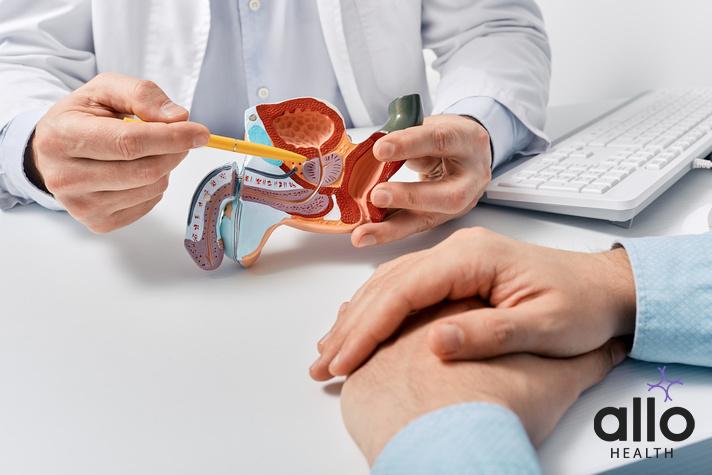Can You Whiten Your Penis?

"The following blog article may discuss medical treatments and interventions. However, it is important to note that the information provided is for general educational purposes only and should not be considered as a substitute for professional medical advice, diagnosis, or treatment. Always seek the guidance of a qualified healthcare professional for personalized medical advice.
Book consultation
Medical treatments are complex and should be tailored to individual circumstances. The information presented in this blog may not be applicable to everyone, as each person's medical condition, history, and needs are unique. Only a qualified healthcare professional can evaluate your specific medical situation, consider relevant factors, and provide appropriate recommendations for diagnosis, treatment options, and monitoring.
It is crucial to note that self-diagnosis, self-medication, or relying solely on the information provided in this blog for treatment decisions can have serious health consequences. "
In a world flooded with skincare trends, the question of whether you can whiten your penis has emerged as a curiosity for many. Wondering about the possibilities?
In this article, we’ll delve into the facts and myths surrounding this topic to provide you with a comprehensive understanding.
Penile Anatomy: Skin and Skin Colour
The penile anatomy, specifically concerning the skin structure in the genital area, is a crucial aspect to understand when exploring factors affecting skin colour. The skin of the penis is comprised of three layers: the epidermis, dermis, and subcutaneous tissue.
Epidermis:
- The outermost layer of the skin.
- Protects against external factors and pathogens.
- Contains melanocytes, cells responsible for producing melanin, the pigment that influences skin colour of the penis.
Dermis:
- Lies beneath the epidermis.
- Houses blood vessels, nerve endings, and connective tissues.
- Plays a role in supporting the epidermis and regulating skin temperature.
Subcutaneous Tissue:
- Located beneath the dermis.
- Comprises fat cells and connective tissue.
- Provides insulation and cushioning.
Read more about the structure and function of penis here.
Factors influencing skin colour in the genital area:
Melanin Production:
- The amount and type of melanin produced by melanocytes determine skin color.
- Genetic factors influence melanin production, leading to variations in skin tone among individuals.
Blood Circulation:
- Blood flow affects skin color, and genital skin may appear darker or lighter depending on circulation.
- Increased blood flow can result in a temporary reddening of the skin.
Hormonal Changes:
- Hormones play a role in melanin production and skin health.
- Changes in hormone levels, such as during puberty or hormonal imbalances, may impact skin color.
Environmental Factors:
- Skin exposure to sunlight can influence skin pigmentation.
- Genital skin, often protected from direct sunlight, may have a different color compared to more exposed areas.
Inflammatory Conditions:
- Skin conditions or inflammation can affect pigmentation.
- Conditions like dermatitis or psoriasis may alter the appearance of the genital skin.

Can You Whiten Your Penis: Debunked
The idea of whitening the penis has become a topic of curiosity, but it’s important to separate fact from fiction. Here are some key points to consider in the debunking of the notion that you can whiten the penis:
- Natural Skin Colour Variation: The colour of the genital skin, including the penis, varies naturally among individuals. Factors such as genetics and ethnic background contribute to this variation.
- No Standard for “Whitening”: Unlike teeth or certain fabrics, there is no standardised process or product for “whitening” the penis. Claims of products or procedures for this purpose may lack scientific backing and have negative effects on your health.
- Skin Health vs. Colour Change: Healthy skin is more about overall well-being than achieving a specific colour. Focusing on proper hygiene, hydration, and skincare promotes overall skin health.
- Misleading Products and Practices: Some products in the market claim to whiten the genital area, but their effectiveness is questionable.The use of unregulated or harsh substances on sensitive skin can lead to adverse reactions.
- Potential Risks of Interventions: Medical procedures or interventions for skin colour change in the genital area may pose risks. Procedures such as laser treatments (genital skin whitening laser) or chemical peels should be approached with caution and under professional guidance.
- Embracing Natural Diversity: The color of the genital skin is diverse and unique to each individual. Embracing and celebrating this diversity promotes positive body image and self-acceptance.
- Consulting Healthcare Professionals: Before considering any interventions, it’s advisable to consult healthcare professionals, such as dermatologists.
Risks of Penis Whitening
While the desire for a specific aesthetic appearance in the genital area is understandable, it’s crucial to be aware of the potential risks associated with attempts to whiten the penis. Here are some considerations:
- Risk of Skin Irritation and Sensitivity: Harsh chemicals or abrasive substances used in certain products can lead to skin irritation and increased sensitivity. The genital skin is particularly sensitive, making it more prone to adverse reactions.
- Allergic Reactions: Some whitening products may contain ingredients that individuals can be allergic to. Allergic reactions can range from mild redness and itching to more severe responses that require medical attention.
- Uneven Skin Tone: Improper application or reactions to products can result in an uneven skin tone. Instead of achieving the desired effect, users may experience patchiness or discolouration.
- Risk of Skin Infections: The use of unregulated or unsanitary products increases the risk of infections. Bacterial infections or fungal infections can occur, leading to discomfort and the need for medical intervention.
- Chemical Burns: Some whitening agents may be too harsh for the delicate genital skin, potentially causing chemical burns. Chemical burns can be painful and may result in long-term damage.
- Scarring and Permanent Skin Damage: Aggressive procedures, such as chemical peels or laser treatments, may carry the risk of scarring or permanent damage to the skin. The genital area is sensitive, and interventions should be approached with caution.
- Psychological Impact: The pursuit of a specific genital appearance can have psychological implications, contributing to body image concerns and anxiety. Unrealistic expectations may lead to dissatisfaction and negative impacts on mental well-being.
- Lack of Regulation: Many products claiming to whiten the penis may lack proper regulation and scientific validation. Users may unknowingly expose themselves to untested and potentially harmful substances.
Before attempting any penis whitening methods, it’s crucial to prioritise overall skin health, consult with healthcare professionals, and be cautious of the potential risks associated with certain products or procedures. Seeking professional ( dermatologist; skin doctor) advice ensures a safer and more informed approach to genital care.
Genital Hygiene Practices to Follow

Maintaining good genital hygiene is essential for overall health and well-being.
- Regular Washing: Gently wash the penis with mild, unscented soap and warm water daily. Pay attention to the foreskin, if present, and clean beneath it.
- Proper Drying: After washing, ensure the genital area is thoroughly dried, as moisture can contribute to bacterial or fungal growth.
- Cotton Underwear: Wear breathable, cotton underwear to allow proper air circulation. Change underwear regularly, especially after exercising or sweating.
- Trimming Pubic Hair: Keeping pubic hair trimmed can reduce moisture and make it easier to maintain cleanliness. Use caution when shaving to avoid irritation and ingrown hairs.
- Avoiding Harsh Products: Use mild, fragrance-free soaps and detergents to prevent irritation. Avoid harsh chemicals or scented products on the genital area.
- Regular Checkups: Perform regular self-examinations to check for any unusual lumps, bumps, or changes in the genital area. Report any abnormalities to a healthcare professional.
- Hydration: Stay well-hydrated to support overall skin health, including the genital area.
- Safe Sex Practices: Practice safe sex to reduce the risk of sexually transmitted infections (STIs). Use condoms consistently and correctly.
- Urination After Sex: Urinate after sexual activity to help flush out bacteria and reduce the risk of urinary tract infections (UTIs).
- Balanced Diet: Maintain a healthy and balanced diet rich in vitamins and minerals to support skin health.
- Avoiding Hot Tubs for Prolonged Periods: Prolonged exposure to hot water, such as in hot tubs, may contribute to irritation or dryness. Limit time spent in hot tubs.
- Regular Exercise: Engage in regular physical activity to promote overall well-being, including circulation to the genital area.
- Consulting Healthcare Professionals: If experiencing any discomfort, unusual symptoms, or concerns about genital health, seek medical advice from a healthcare professional.
Key Takeaways
- The question of penis whitening has sparked curiosity, leading to an exploration of facts and myths in this article.
- Penile anatomy, encompassing the skin structure and color factors, involves three layers: epidermis, dermis, and subcutaneous tissue.
- Factors influencing genital skin color include melanin production, blood circulation, hormonal changes, environmental factors, and inflammatory conditions.
- The debunking of penis lightening emphasises natural skin color variation, lack of standardization, the importance of overall skin health, and potential risks of interventions.
- Risks associated with penis whitening include skin irritation, allergic reactions, uneven skin tone, risk of infections, chemical burns, scarring, psychological impact, and lack of regulation.
- Genital hygiene practices focus on regular washing, proper drying, wearing cotton underwear, trimming pubic hair, avoiding harsh products, regular checkups, hydration, safe sex practices, urination after sex, a balanced diet, limiting hot tub exposure, regular exercise, and consulting healthcare professionals.
Frequently Asked Questions
Q: Is it possible to whiten the penis naturally?
A: Natural methods for changing genital skin color are limited, and claims of natural whitening should be approached with caution.
Q: Are there specific products for penis whitening?
A: Some products claim to whiten the penis, but their effectiveness is often unproven, and the use of such products may carry risks.
Q: Do medical procedures exist for penis whitening?
A: Medical interventions like laser treatments or chemical peels may be promoted for genital skin color change, but these carry potential risks.
Q: What are the risks of attempting to whiten the penis?
A: Risks may include skin irritation, allergic reactions, uneven skin tone, infections, chemical burns, scarring, and psychological impact.
Q: Can the color of the penis be permanently changed?
A: Permanent changes to genital skin color are challenging, and procedures claiming to achieve this should be approached with caution.












































